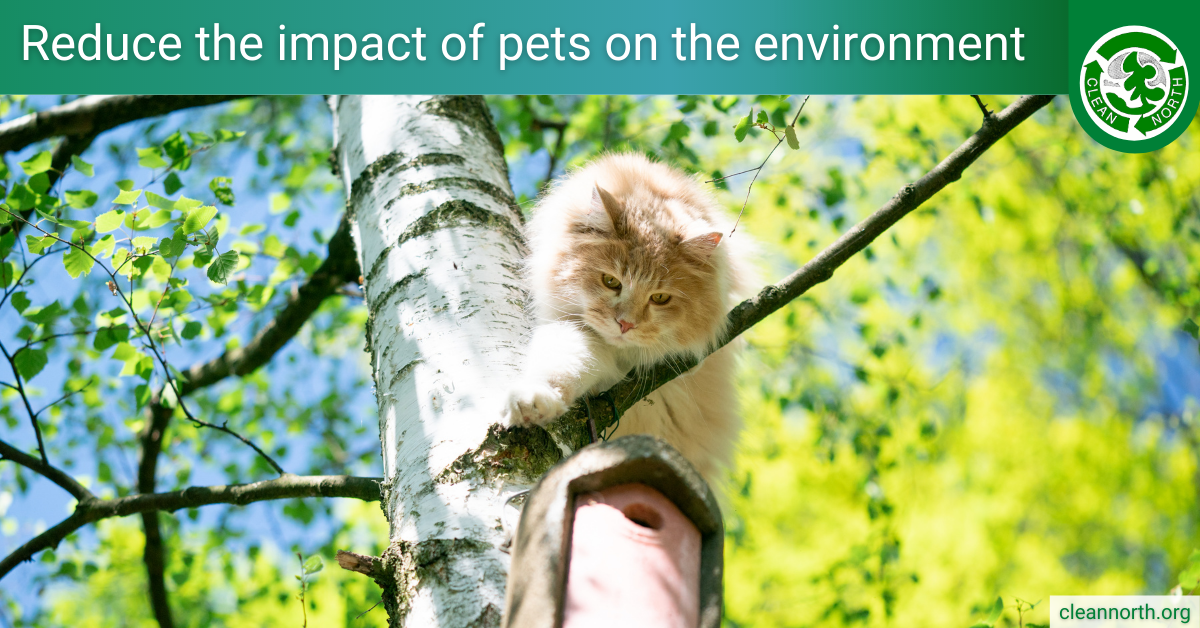
Our pets bring us much comfort and joy—but they come with environmental impacts. So what are these impacts, and how can you limit them?
Choose a shelter animal—and scale down
Rescuing a pet that’s been dropped off at a shelter is generally considered more ethical than ordering one from a breeder. However, that’s not the only criteria for judging “greenness” in pet choices. A small purebred animal may eat much less meat and produce less waste over its lifespan than a 120-pound shelter dog will.
Indeed, a key impact of pets, particularly dogs and cats, is the shocking amount of meat they eat. Canada has about 6 million dogs and about 8 million cats. One U.S. study showed that dogs and cats consume about 19% of the total calories consumed in our neighbour to the south—more than the entire population of France! That’s a lot of meat production, and it’s clear that raising massive numbers of livestock contributes to climate change.
Choosing shelter animals, having fewer pets, and choosing smaller animals are three ways you can help reduce your family’s pet-related carbon footprint.
You can also talk to your veterinarian about whether fancy “premium” pet foods are necessary. Some of these foods are overkill in terms of protein content and come with a higher environmental footprint given the meat source. Also consult your veterinarian before trying to switch your pet to a vegetarian diet. That’s tricky, especially with cats, who are diehard carnivores.
Accessorize less
Pet stores are alluring places, full of fun accessories for Fifi and Fido, many of which contain plastic. The reality is, our pets’ needs are fairly simple. They don’t have to have a bed fit for a king or a chest full of toys. Take a minimalist approach — avoid cheap plastic, buy quality items that last, and try to find items that are ethically sourced and have less environmental impact. And resist the urge to stock up on multiple novelty doggie sweaters that are really for us, not our pet.
Curb your pets’ impacts on wildlife
When it comes to the natural world, domestic dogs and cats are considered invasive species. This descriptor is not meant as an insult but rather to indicate that they are not native to Ontario and can cause major harm in our natural areas.
It probably surprises few that cats are even more damaging than dogs because they are often allowed to roam free and have a masterful ability to take down birds. Every year in Canada, cats are estimated to kill from 100 to 350 MILLION songbirds! They are a major reason for the decline of bird populations around the world. And both dogs and cats have been linked to wild species becoming extinct.
We can help protect our local ecosystems by keeping dogs under control when outside and by not allowing cats to roam freely. Keeping cats inside is better for them as well — outdoor cats are more likely to get sick, hit by a car, or die by being attacked by a larger animal.
And about aquarium pets—never, ever release a non-native fish, amphibian, or reptile into our water system or a nearby lake or river. In some parts of Canada, including Lake Ontario, goldfish have established breeding populations, displacing native aquatic species.
The toxic poop on pet waste
Dog poop may be natural but it’s not safe to leave it on the sidewalk or in a wooded area: It’s a toxic pollutant that can take a year to break down. Dog poop can contain bacteria like E. coli and salmonella and parasites like roundworm and tapeworms. Some pathogens from dog poop can stay active in soil for years. Children who play outside and gardeners are most at risk. Wildlife can be attracted to dog poop and also be harmed.
Another way unscooped poop is harmful is when rainwater washes it into our lakes, streams, and rivers. We can end up swimming in fecal bacteria. The nutrients in poop can also cause toxic algae blooms and affect water quality to the point where fish and other aquatic life are affected (read about the first-ever study on the impact of dog feces on urban fish populations: https://www.exchangemagazine.com/…/Thursday/21022402.htm). It’s best to avoid letting your dog poop within about 60 metres/200 feet from a lake or river. And never toss or hose dog waste into a storm drain.
So why is it ok to use cow or sheep manure in your yard but not let dog waste lie? Commercial manure is composted, which kills bacteria and parasites, plus livestock eat only plants so carry fewer pathogens that affect humans.
Re: poop scoop bags: you may have noticed that fewer stores are offering single-use plastic bags, often-reused for poop scooping. Please do not start buying poop scoop bags or you just add to the plastic problem. An alternative: Save bread, bagel, frozen fruit, and other bags for reuse in poop scooping.
You may see ads for allegedly biodegradable or compostable poop scoop bags. These are controversial, so do your homework. They don’t always break down as claimed.
One final tip for reducing the poop problem: If you feed your dogs higher-quality food, they will probably poop less (higher quality = less fillers). Ask your veterinarian for a recommendation as foods marketed as “premium” may not actually be best for your dog and the environment.
Want to learn more?
- Fido, Fluffy, and wildlife conservation: The environmental consequences of domesticated animals
- Is your dog or cat bad for the environment?
- How feeding and caring for 800 million pets hurts Mother Nature
- Keep cats inside to reduce toll on birds, small mammals and other urban wildlife: conservation experts
- Up to 50 million goldfish in Lake Ontario, hurting ecosystem




